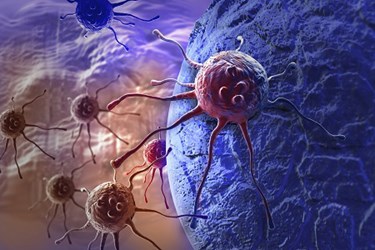New Therapeutic Target May Help Improve Cancer Drugs' Efficacy

Researchers from the Barts Cancer Institute, associated with Queen Mary University of London, reported that targeting the molecule focal adhesion kinase (FAK) may help enhance the efficacy of cancer drugs.
FAK leads the body to repair itself after chemotherapy or radiotherapy. Excision of FAK in blood vessels present in melanoma and lung cancer models resulted in more effective chemotherapy and radiation therapies.
Dr Bernardo Tavora, lead author of the Barts study, said, “This work shows that sensitivity to cancer treatment is related to our own body mistakenly trying to shield the cancer from cell-killing effects caused by radiotherapy and chemotherapy. Although taking out FAK from blood vessels won't destroy the cancer by itself, it can remove the barrier cancer uses to protect itself from treatment.”
The team took samples from lymphoma patients for study and found that those with low FAK levels in blood vessels had a higher rate of complete remission after treatment. The findings indicate that developing anti-FAK drugs in cancer blood vessels offers the potential to boost treatments and help keep cancer down.
In a separate study, FAK was also implicated in the spread of ovarian cancer by helping small tumor cells clusters called spheroids survive. Researchers associated high levels of FAK expression with poor prognosis for some patients with ovarian cancer. Again, the findings support clinical trials of FAK inhibitors toward developing new agents that prevent cancer progression.
Commenting on the Barts study on FAK as a therapeutic target, Dr. Kat Arney, Cancer Research UK's science communications manager, said, “This exciting research may have cracked how healthy cells in the blood vessels are protecting against cancer treatments. This research was only done in mice, but it gives real hope that we can boost the effectiveness of cancer medicine and sensitize cancers to the drugs we have.”
Dr. Arney and colleagues from the Cancer Research Institute recently published a study detailing fundamental processes in the cancer life cycle, which may also be a fundamental tool used to develop weapons against cancer.
